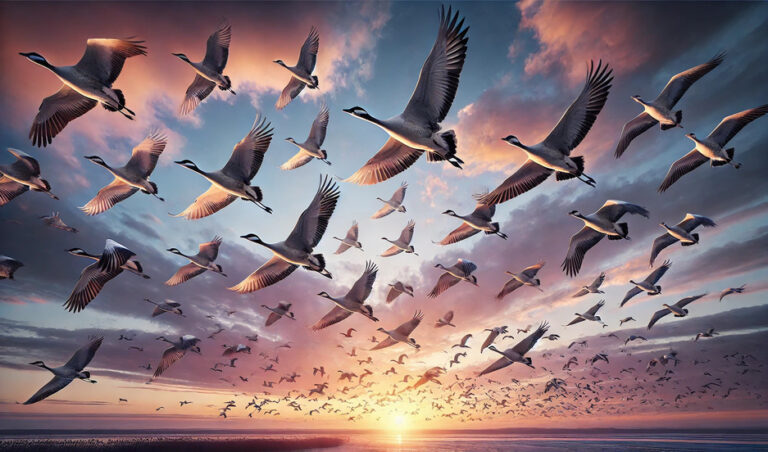![]()
Migrant birds are species that travel from their breeding grounds to wintering grounds, often crossing international borders. In India, migrant birds arrive from various parts of the world, including Europe, Asia, and Africa. Some notable migrant birds in India include the Siberian Crane, Amur Falcon, and Bar-headed Goose. These birds travel thousands of miles to escape harsh weather conditions, find food, and breed. India’s diverse landscapes and climates make it an attractive destination for these feathered travelers. They arrive between September and November, and depart by February or March.
Migrant Birds in India
India, with its diverse geography and climate, is a haven for migratory birds. Each year, millions of birds travel thousands of kilometers to Indian shores, drawn by favorable conditions for breeding, feeding, and roosting. Migratory birds in India include a variety of species . The arrival of these birds not only enriches India’s biodiversity but also plays a significant role in ecological balance.
Types of Migratory Birds in India
India hosts a wide range of migratory birds, including:
- Waterfowl: Species like the Bar-headed Goose, Ruddy Shelduck, and Northern Pintail migrate to Indian wetlands.
- Waders: Birds such as the Black-tailed Godwit, Common Sandpiper, and Eurasian Curlew visit coastal areas.
- Raptors: Steppe Eagles and Peregrine Falcons are notable winter visitors.
- Cranes: The Demoiselle Crane and Siberian Crane, though rare now, have historical significance in India’s migratory bird history.
- Passerines: Smaller birds like Bluethroats and Rosy Starlings also travel to India.
Reasons for Migration to Indian Coasts
Migratory birds travel to India for several reasons:
- Favorable Climate: India’s moderate winters offer a refuge from the harsh cold in their breeding grounds in Siberia, Central Asia, and Europe.
- Food Availability: Wetlands, estuaries, and forests in India provide abundant food resources.
- Breeding and Roosting Grounds: Some birds migrate to breed, while others find ideal conditions for resting during their long journeys.
Navigation System of Migratory Birds
Birds have remarkable navigation abilities, enabling them to traverse vast distances without getting lost. They rely on:
- Earth’s Magnetic Field: Specialized cells in their brain allow them to detect magnetic fields, guiding their migration.
- Celestial Navigation: They use the position of the sun, stars, and moon to orient themselves.
- Landmarks: Birds often remember geographical landmarks such as rivers, mountains, and coastlines.
- Olfactory Cues: Certain species use their sense of smell for navigation.
GPS-Like System Without Internet
Migratory birds possess a natural GPS-like system, relying on:
- Magnetoreception: A biological mechanism that helps detect Earth’s magnetic field for navigation.
- Memory and Instinct: Generations of migratory patterns are encoded in their genes, guiding them instinctively.
Benefits to India
Migratory birds bring several ecological, economic, and cultural benefits:
- Pollination and Seed Dispersal: They aid in pollination and seed dispersal, contributing to biodiversity.
- Ecotourism: Bird sanctuaries such as Bharatpur and Chilika Lake attract tourists, boosting local economies.
- Indicator of Environmental Health: Migratory birds reflect the health of ecosystems, alerting authorities to environmental changes.
- Pest Control: Many migratory birds consume insects, helping control agricultural pests.
In conclusion, migratory birds play an integral role in maintaining ecological balance and enriching India’s natural heritage. Protecting their habitats through conservation efforts is essential for preserving this vital connection between continents and ecosystems.







